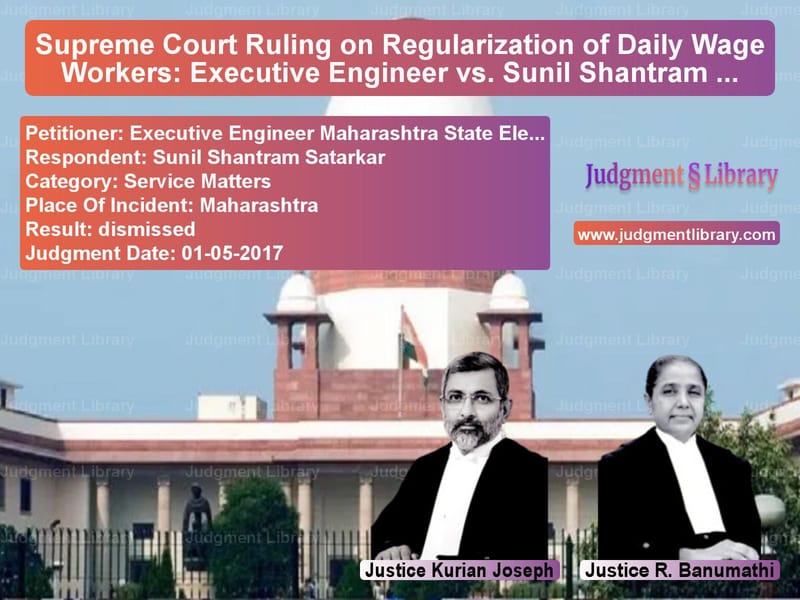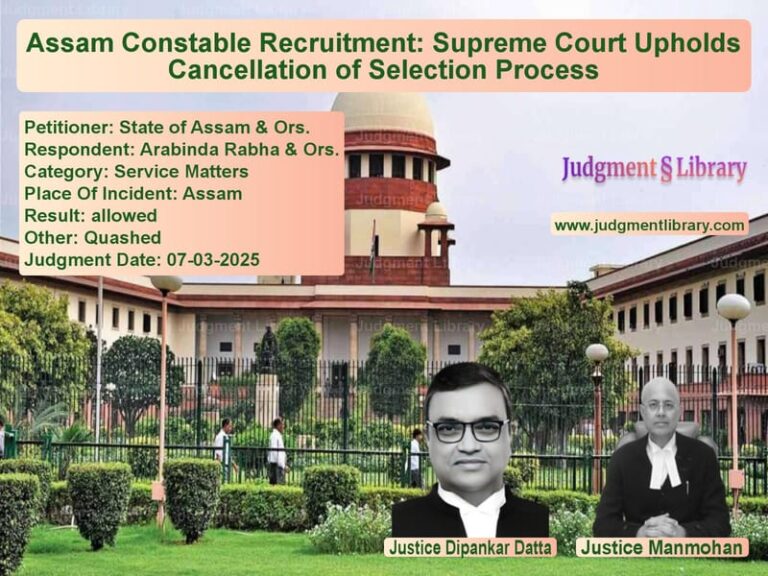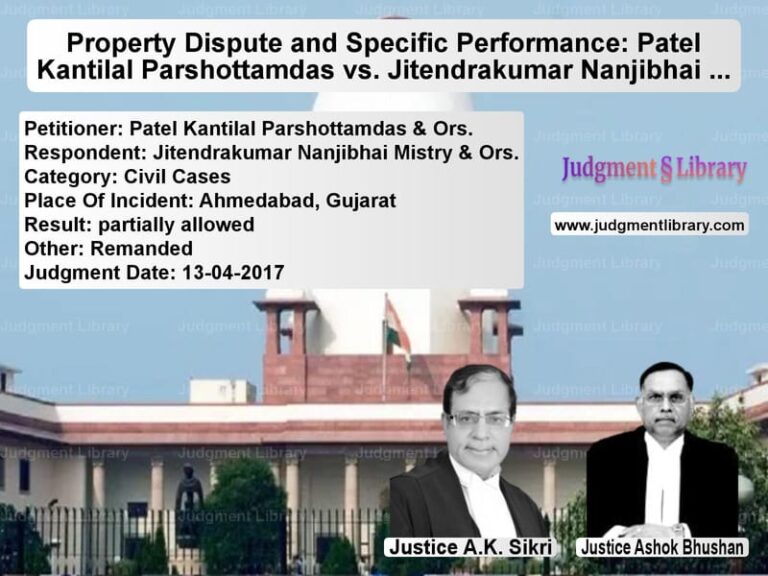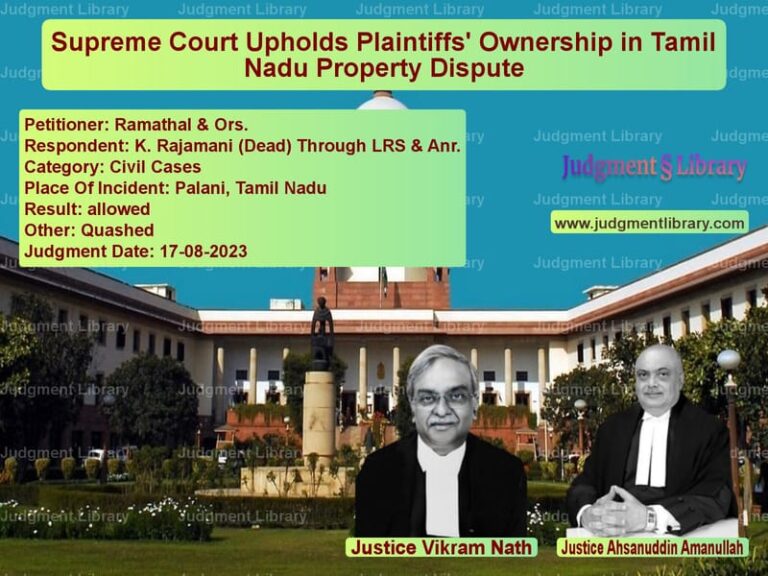Supreme Court Ruling on Regularization of Daily Wage Workers: Executive Engineer vs. Sunil Shantram Satarkar
The Supreme Court, in the case of Executive Engineer Maharashtra State Electricity Board vs. Sunil Shantram Satarkar, addressed a significant issue concerning the regularization of daily wage workers under the precedent set in State of Karnataka vs. Uma Devi. This case is crucial for contract workers and daily wagers who have served in government or public sector organizations for extended periods.
Background of the Case
The appellant, the Executive Engineer of the Maharashtra State Electricity Board (MSEB), challenged the order of the Industrial Court, which directed the reinstatement or regularization of certain workers engaged as daily wagers in Class IV positions. The High Court of Bombay upheld the Industrial Court’s decision, leading to the appeal before the Supreme Court.
The primary legal issue was whether the respondents could be granted permanency or regularization in their employment despite the judgment in Uma Devi, which ruled against regularization of contractual or temporary employees.
Legal Issues Involved
1. Applicability of the Uma Devi Judgment
Whether the directions in State of Karnataka vs. Uma Devi prevented the respondents from claiming regularization or permanency.
2. Consideration of Workers as a One-Time Measure
Whether the workers, who had been employed for over 25 years as daily wagers, should be considered for regularization as a one-time measure.
3. Parity with Similarly Situated Workers
Whether denying regularization to the respondents was unjustified when other similarly placed workers had already been granted permanency.
Arguments Presented
Petitioner’s (MSEB) Arguments
- The Industrial Court’s order violated the principles laid down in Uma Devi, which barred the regularization of temporary or contractual employees.
- The respondents were engaged as daily wage workers and had no legal right to claim permanency.
- Granting regularization to these employees would create an unfair financial burden on the public sector organization.
Respondents’ (Sunil Shantram Satarkar & Others) Arguments
- Even under Uma Devi, the state was bound to consider regularization as a one-time measure for workers who had served for long durations.
- Many similarly placed workers had already been granted permanency, and denying the same benefit to the respondents was discriminatory.
- The respondents had been working for over 25 years as daily wagers and were performing duties identical to those of permanent employees.
Supreme Court’s Observations
The Supreme Court analyzed the facts and precedents, making the following key observations:
- The Uma Devi judgment did not impose an absolute bar on regularization but allowed for exceptional cases where workers had been employed for an extended period.
- The appellants had already regularized other similarly placed workers, and it was unfair to deny the same treatment to the respondents.
- The respondents had been working continuously for over 25 years, making their case different from temporary or short-term contractual employment.
Key Verbal Arguments by the Court
“In case any similarly situated workmen who worked for 25 years or less have been made permanent, we do not find any justification in denying a similar treatment to the respondents herein.”
“The appellants must consider the case of respondents in the light of the directions issued by the Industrial Court and as affirmed by the High Court, taking into consideration similar treatment granted to similarly situated workmen.”
“It will be open to the respondents to point out similar instances to the appellants within a period of one month from today. Necessary orders in the light of the similar instances pointed out by the respondents shall be passed by the appellants within a period of one month thereafter.”
Final Judgment
The Supreme Court ruled:
- The appeal was dismissed, and the Industrial Court’s order was upheld.
- The appellants were directed to consider the respondents’ cases for regularization in light of similarly placed workers who had been granted permanency.
- The respondents were given one month to point out similar instances where other daily wage workers had been regularized.
- The appellants were required to pass orders on the respondents’ cases within one month after receiving such details.
Significance of the Judgment
This ruling has far-reaching implications for daily wage workers:
- It reinforces the principle that long-serving daily wagers should not be treated unfairly when similarly placed workers have been regularized.
- It clarifies that Uma Devi does not create an absolute prohibition against regularization.
- It sets a precedent that public sector organizations must ensure equal treatment in matters of employment regularization.
Conclusion
The Supreme Court’s judgment in Executive Engineer Maharashtra State Electricity Board vs. Sunil Shantram Satarkar establishes an important precedent for contract and daily wage workers seeking regularization. It underscores the importance of fairness in employment practices, ensuring that those who have worked for decades under precarious conditions are not arbitrarily denied permanency.
Don’t miss out on the full details! Download the complete judgment in PDF format below and gain valuable insights instantly!
Download Judgment: Executive Engineer M vs Sunil Shantram Satar Supreme Court of India Judgment Dated 01-05-2017.pdf
Direct Downlaod Judgment: Direct downlaod this Judgment
See all petitions in Employment Disputes
See all petitions in Public Sector Employees
See all petitions in Termination Cases
See all petitions in Judgment by Kurian Joseph
See all petitions in Judgment by R. Banumathi
See all petitions in dismissed
See all petitions in supreme court of India judgments May 2017
See all petitions in 2017 judgments
See all posts in Service Matters Category
See all allowed petitions in Service Matters Category
See all Dismissed petitions in Service Matters Category
See all partially allowed petitions in Service Matters Category







